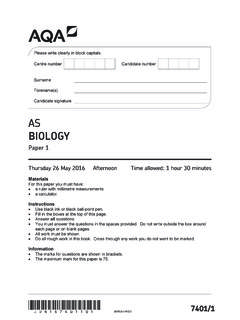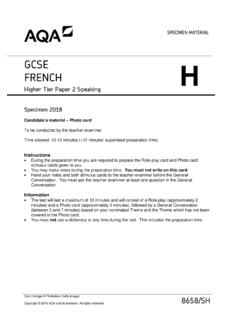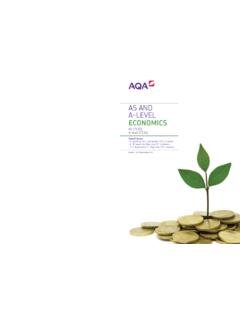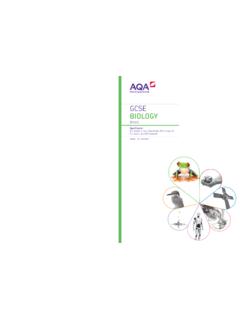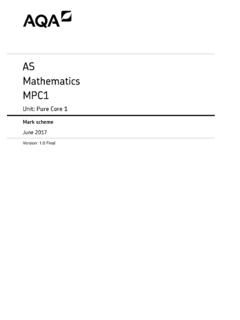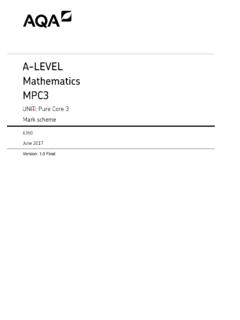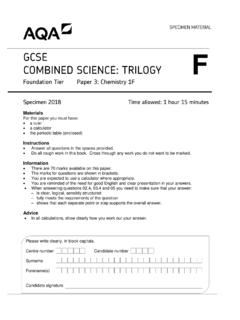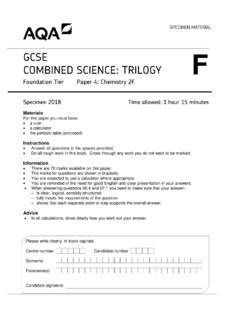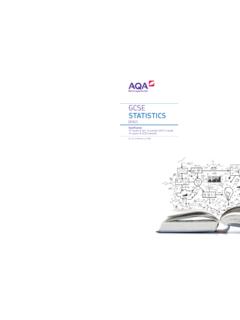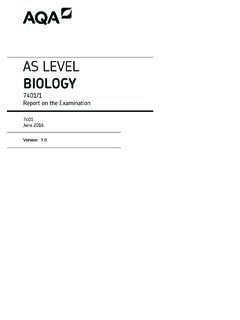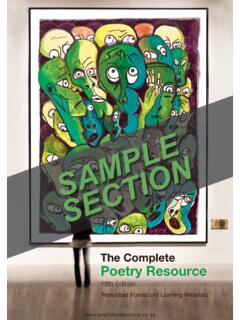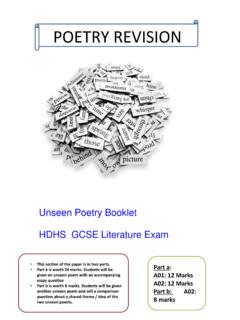Transcription of Get help and support Building skills E: english-gcse@aqa ...
1 Get help and support Building skills Visit our website for information, guidance, support and resources at You can talk to us directly E: T: 0161 953 7504 and confidence @AQAE nglish with unseen poetry GCSE English Literature Teaching guide Copyright 2021 AQA and its licensors. All rights reserved. AQA retains the copyright on all its publications, including these specifications. However, schools and colleges registered with AQA are permitted to copy material from these specifications for their own internal use. G02354. AQA Education (AQA) is a registered charity (number 1073334) and a company limited by guarantee registered in England and Wales (company number 3644723). Our registered address is AQA, Devas Street, Manchester M15 6EX. 2021 AQA 2 of 54. Contents Page Introduction 5. Collection to support teaching unseen poetry A Poison Tree' by William Blake (1789). 6. Grief' by Kayo Chingonyi (2017). 7. Poem Resisting Arrest' by Kyle Dargan (2018).
2 8. The Truth about Monsters' by Nikita Gill (2017). 9. The Voice' by Thomas Hardy (1912). 10. In My Country' by Jackie Kay (1993). 11. Hadrian's Wall' by Daljit Nagra (2016). 12. Anthem for Doomed Youth' by Wilfred Owen (1920). 13. A Birthday' by Christina Rossetti (1862). 14. Mother to Son' by Langston Hughes (1922) 15. Section 1: Approaches to reading poems 16. Section 2: Unlocking meanings 21. Section 3: Words, words, words 26. Section 4: Exploring structure and patterns 27. 2021 AQA 3 of 54. Contents Page Section 5: Speakers and voices 29. Section 6: Comparing/connecting poems 32. Exam preparation 36. Appendix Statement of importance 39. Text to self, text to text and text to world 40. Gradual release of responsibility 41. Handout 1: Reading boxes 42. Handout 2: Tate gallery pictures 43. Further resources 45. Acknowledgement 52. 2021 AQA 4 of 54. Introduction GCSE English Literature assesses a student's personal and critical response to a text and their consideration of the ways in which the writer has presented their ideas.
3 In addition, aspects of the literature exam assesses the ability to make comparisons and links across texts; and the relevance of contextual factors. This guide is designed to support your teaching of poetry , specifically in preparation for the unseen poetry part of the exam. However, these activities and strategies can also be adapted for teaching the poetry anthology and, potentially, other texts studied throughout the course. Before going any further, it is worth being reminded of the Statement of importance which can be found at the front of every mark scheme and is provided for you here (see appendix 1). The Statement of importance defines the purpose of the literature qualification; it describes and defines what we believe is vital about the study of literary texts at GCSE level the inter-relationship between reader and writer. The balance of Assessment Objectives and mark schemes are an extension of this statement. Using the Teaching guide The activities and approaches suggested in this guide are designed to provide opportunities for students to develop a skillset that will enable them to read and respond to unseen poetry .
4 The activities will reference some of the poems and poets in the accompanying unseen poetry collection; you are also free to use the same activities with poems of your choosing. Knowing teachers welcome the opportunity to select their own texts, at the end of this resource, we signpost links to websites worth exploring to find further teaching resources or poems (see appendix 3). Each section of suggested activities and strategies looks at a particular skillset or theme aiming to develop students' knowledge of how to read, explore and respond to a poem. You don't necessarily need to follow these in the sequence provided, nor are the activities and strategies either exhaustive or to be treated as prescriptive. Taken holistically, the overall aim is: to build confidence in approaching unseen poetry ; to support progression in AO1 and AO2; and to develop the skill of comparison. 2021 AQA 5 of 54. Collection to support teaching unseen poetry We have curated a small selection of poems to use with the teaching activities and strategies in this guide.
5 Building learning towards the unseen poetry question is an opportunity for teachers to engage students with a diverse range of writers, styles and ideas. We encourage you to bolster this collection with poems you enjoy teaching or make connections with the AQA poetry anthologies, past and present. The poems selected include some old favourites (such as Christina Rossetti and Thomas Hardy) as well as fresh, contemporary voices (for example Nikita Gill and Kayo Chingonyi). They also cover a range of universal themes from identity, relationships and exploring human nature, to love, loss and conflict. A Poison Tree' by William Blake (1789). I was angry with my friend;. I told my wrath, my wrath did end. I was angry with my foe: I told it not, my wrath did grow. And I waterd it in fears, Night & morning with my tears: And I sunned it with smiles, And with soft deceitful wiles. And it grew both day and night. Till it bore an apple bright.
6 And my foe beheld it shine, And he knew that it was mine. And into my garden stole, When the night had veild the pole;. In the morning glad I see;. My foe outstretched beneath the tree. You can listen to a reading of this poem courtesy of the poetry Station, read by Dannie Abse (and illustrated with paintings by children at Coleridge Primary School, North London). 2021 AQA 6 of 54. Grief' by Kayo Chingonyi (2017). What became of the boy who called himself Grief? The boy who, the story ran, harboured a gun through the back-roads and alleyways of his teens the boy who turned up as a footnote the night we played my ends are rougher than your ends in a flat overlooking London Road frontline of a post-code war from which we were so far removed we chuckled when someone said kebabs from the shop that wore a fresh batch of memorial flowers were to die for. Grief was grit to lend the fable texture. We never knew the name his mum called him, or what reduced him to plying the night trade so white kids could say they bun high grade*.
7 He is a boy caught between commas in a news reports about youth crime, an image fixed in place by someone else's language. bun high grade* - Jamaican slang for smoking strong cannabis From Kumukanda by Kayo Chingonyi, published by Vintage. Reproduced by permission of Random House. 2016. You can listen to Kayo Chingonyi talking about the influence of music on poetry on YouTube. You can also visit his website 2021 AQA 7 of 54. Poem Resisting Arrest' by Kyle Dargan (2018). This poem is guilty. It assumed it retained the right to ask its question after the page came up flush against its face. The purpose this poem serves is obvious, even to this poem, and that cannot stop the pen or the fist choking it. How the page tastes at times unsalted powerlessness in this poem's mouth, a blend of that and what it has inhaled of the news. It spits blood inking. It is its own doing and undoing. This poem is trying to hold itself together. It has the right to remain either bruised or silent, but it is a poem, so it hears you'd be safer if you stopped acting like a poem, stopped resisting.
8 Where is the daylight (this poem asks and is thus crushed) between existence and resistance, between the now-bloodied page and the poem? Another poem will record the arrest of this poem, decide what to excerpt. That poem will fail . it won't find the right metaphor for the pain of having to lift epigraphs from the closing words of poems that were accused of resisting. That poem is numb. This poem is becoming numb, already losing feeling in its cuffed phrasing. No one will remember the nothing of which this poem was accused just that it was another poem that bled. This poem never expected to be this poem, yet it must be for you who will not acknowledge the question . This poem knew it was dangerous to ask why? Poem Resisting Arrest' by Kyle Dargan, in Anagnorisis (TriQuarterly Books, 2018). You can listen to Kyle Dargan reading his poem on YouTube. 2021 AQA 8 of 54. The Truth about Monsters' by Nikita Gill (2017). The truth is this, every monster you have met or will ever meet, was once a human being with a soul that was as soft and light as silk.
9 Someone stole that silk from their soul and turned them into this So when you see a monster next, always remember this. Do not fear the thing before you. Fear the thing that created it instead. The Truth About Monsters Nikita Gill 2021 AQA 9 of 54. The Voice' by Thomas Hardy (1912). Woman much missed, how you call to me, call to me, Saying that now you are not as you were When you had changed from the one who was all to me, But as at first, when our day was fair. Can it be you that I hear? Let me view you, then, Standing as when I drew near to the town Where you would wait for me: yes, as I knew you then, Even to the original air-blue gown! Or is it only the breeze in its listlessness Traveling across the wet mead to me here, You being ever dissolved to wan wistlessness, Heard no more again far or near? Thus I; faltering forward, Leaves around me falling, Wind oozing thin through the thorn from norward, And the woman calling. A recording of this poem read by Anthony Thwaite is available on the The poetry Archive website: 2021 AQA 10 of 54.
10 In My Country' by Jackie Kay (1993). walking by the waters down where an honest river shakes hands with the sea, a woman passed round me in a slow, watchful circle, as if I were a superstition;. or the worst dregs of her imagination, so when she finally spoke her words spliced into bars of an old wheel. A segment of air. Where do you come from? "Here", I said, "Here. These parts.. In My Country' in Darling: New & Selected Poems (Bloodaxe Books, 2007) by permission of the publisher. Jackie Kay describes this as a poem about being black and Scottish. A recording of this poem read by Jackie Kay is available on The poetry Archive website: 2021 AQA 11 of 54. Hadrian's Wall' by Daljit Nagra (2016). Around the old blown names Birdoswald, Cawfields or Vindolanda, each fortress and straight line of stone partition was built by a zealous emperor to keep out the barbarous. I've come to this wall crowning England, this symbol of divided man, to honour the lineage of our tall ideals.
